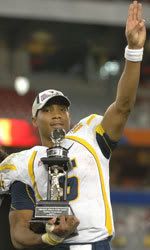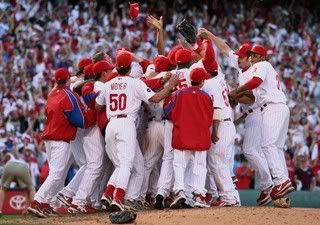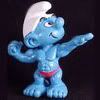Post by rainman on Jan 18, 2008 21:58:53 GMT -5
Steel Curtain's Holmes dies in car wreck
Updated: January 18, 2008, 9:18 PM LUMBERTON, Texas (AP) - Ernie Holmes settled into a quiet life as a preacher in rural Texas after his "stone crazy" days with Pittsburgh's "Steel Curtain" defenses.
Holmes, a two-time Super Bowl champion with the Steelers, died Thursday night after his car left a road and rolled several times near Lumberton, about 80 miles from Houston, a Texas Department of Public Safety dispatcher said. He was 59.
Holmes was a two-time All-Pro performer and won two Super Bowls with the Steelers. (File / Associated Press)
Holmes, driving alone and not wearing a seat belt, was ejected and died at the scene, the department said.
The Steelers remembered him as a devastating and intimidating force on a defense full of them. He also had his moments off the field.
Holmes told Time magazine in 1975 that he was "stone crazy," mostly because of a case early in his career when he pleaded guilty to assault with a deadly weapon following a bizarre episode in which he fired a pistol at trucks and a police helicopter. He was sentenced to five years' probation.
"Ernie was an original. He was out there," said former Steelers receiver Lynn Swann, a teammate on Super Bowl-winning teams following the 1974 and '75 seasons. "In today's environment, he may have spent a few hours in the commissioner's office."
Nicknamed "Fats" for most of his life, Holmes played for the Steelers from 1972-77 before being released because of ongoing weight problems and spent part of the 1978 season with New England before retiring.
He was part of a famous front four that included "Mean" Joe Greene, L.C. Greenwood and Dwight White.
"Ernie was one of the toughest players to ever wear a Steelers uniform," Steelers chairman Dan Rooney said in a statement. "At his best, he was an intimidating player who even the toughest of opponents did not want to play against."
Holmes, who was about 6-foot-3 and 260 pounds during his career but weighed as much as 400 after he retired, also told Time he was attracted to the violence of football.
"I don't mind knocking somebody out," Holmes said. "If I hear a moan and a groan coming from a player I've hit, the adrenaline flows within me. I get more energy and play harder."
After football, Holmes had minor acting roles. He appeared in an episode of the 1980s TV show "The A-Team" and dabbled in professional wrestling.
Eventually, though, he settled down on a ranch near tiny Wiergate, a town of 461 close to the Louisiana border. He was an ordained minister, had his own church and told the Steelers he was a more "spiritual being."
The Steelers took note of the difference in Holmes at reunions and autograph shows. Former linebacker Andy Russell said Holmes had taken "meaningful steps in improving his life" and seemed to be a "much more thoughtful kind of person"
"Ernie seemed to be doing well in recent years and was always one of our most popular players whenever he returned to Pittsburgh for team events," Rooney said. "Our prayers go out to Ernie's family and loved ones. He will be missed by the entire Steelers family."
Greene, the Hall of Fame lineman who played beside Holmes, recalled the two sides of Holmes.
To motivate his teammates, Holmes purposefully strayed into the Raiders' warmups to tell star lineman Gene Upshaw before the January 1976 AFC championship game what the Steelers would do to him and Oakland. The Steelers went on to win 24-13. But at a team Christmas party, Holmes surprised everyone by dressing up like Santa Claus and handing out toys.
"I don't recall anybody telling him to do that," Greene said. "That was Ernie."
White said he was in "deep grief" Friday.
"Ernie was a very colorful person that you couldn't help but like off the football field - a little different on the field as we well know," White said. "Ernie had gotten into the ministry and ... was a true inspiration to Joe, L.C., and myself when we were together. You know, it's all about where you end up, and Ernie blossomed into an individual that I respected, admired and will miss."
Holmes, drafted out of Texas Southern, was part of a defense that held Minnesota to 17 yards rushing and 119 total yards in the 1975 Super Bowl. The Steelers won their first title, 16-6. They were back a year later, beating Dallas 21-17 for the championship.
The 1976 Steelers defense was one of the best in NFL history, shutting out five opponents - three in a row - during a nine-game, season-ending winning streak. The Steelers allowed only 28 points during those nine games, an average of slightly more than a field goal per game.
"He was devastating and would just destroy the opponent across from him," Russell said. "Sometimes I had to remind him to tackle the guy with the pigskin. He was a brilliant player. He played all with his heart."
He used his head, too. Besides "Fats," he was also known as "Arrowhead" because in 1974 he shaved his head, leaving only an arrow-shaped pattern of hair on his skull.
"I asked him, 'What the hell did you do that for?"' longtime Steelers director of communications Joe Gordon said. "We were getting ready to play the Chiefs in Arrowhead Stadium. He said, 'That's to point me to the quarterback.'
"He had a split personality. He was a maniac on the field and a teddy bear off it. But he was a terrific guy."
Updated: January 18, 2008, 9:18 PM LUMBERTON, Texas (AP) - Ernie Holmes settled into a quiet life as a preacher in rural Texas after his "stone crazy" days with Pittsburgh's "Steel Curtain" defenses.
Holmes, a two-time Super Bowl champion with the Steelers, died Thursday night after his car left a road and rolled several times near Lumberton, about 80 miles from Houston, a Texas Department of Public Safety dispatcher said. He was 59.
Holmes was a two-time All-Pro performer and won two Super Bowls with the Steelers. (File / Associated Press)
Holmes, driving alone and not wearing a seat belt, was ejected and died at the scene, the department said.
The Steelers remembered him as a devastating and intimidating force on a defense full of them. He also had his moments off the field.
Holmes told Time magazine in 1975 that he was "stone crazy," mostly because of a case early in his career when he pleaded guilty to assault with a deadly weapon following a bizarre episode in which he fired a pistol at trucks and a police helicopter. He was sentenced to five years' probation.
"Ernie was an original. He was out there," said former Steelers receiver Lynn Swann, a teammate on Super Bowl-winning teams following the 1974 and '75 seasons. "In today's environment, he may have spent a few hours in the commissioner's office."
Nicknamed "Fats" for most of his life, Holmes played for the Steelers from 1972-77 before being released because of ongoing weight problems and spent part of the 1978 season with New England before retiring.
He was part of a famous front four that included "Mean" Joe Greene, L.C. Greenwood and Dwight White.
"Ernie was one of the toughest players to ever wear a Steelers uniform," Steelers chairman Dan Rooney said in a statement. "At his best, he was an intimidating player who even the toughest of opponents did not want to play against."
Holmes, who was about 6-foot-3 and 260 pounds during his career but weighed as much as 400 after he retired, also told Time he was attracted to the violence of football.
"I don't mind knocking somebody out," Holmes said. "If I hear a moan and a groan coming from a player I've hit, the adrenaline flows within me. I get more energy and play harder."
After football, Holmes had minor acting roles. He appeared in an episode of the 1980s TV show "The A-Team" and dabbled in professional wrestling.
Eventually, though, he settled down on a ranch near tiny Wiergate, a town of 461 close to the Louisiana border. He was an ordained minister, had his own church and told the Steelers he was a more "spiritual being."
The Steelers took note of the difference in Holmes at reunions and autograph shows. Former linebacker Andy Russell said Holmes had taken "meaningful steps in improving his life" and seemed to be a "much more thoughtful kind of person"
"Ernie seemed to be doing well in recent years and was always one of our most popular players whenever he returned to Pittsburgh for team events," Rooney said. "Our prayers go out to Ernie's family and loved ones. He will be missed by the entire Steelers family."
Greene, the Hall of Fame lineman who played beside Holmes, recalled the two sides of Holmes.
To motivate his teammates, Holmes purposefully strayed into the Raiders' warmups to tell star lineman Gene Upshaw before the January 1976 AFC championship game what the Steelers would do to him and Oakland. The Steelers went on to win 24-13. But at a team Christmas party, Holmes surprised everyone by dressing up like Santa Claus and handing out toys.
"I don't recall anybody telling him to do that," Greene said. "That was Ernie."
White said he was in "deep grief" Friday.
"Ernie was a very colorful person that you couldn't help but like off the football field - a little different on the field as we well know," White said. "Ernie had gotten into the ministry and ... was a true inspiration to Joe, L.C., and myself when we were together. You know, it's all about where you end up, and Ernie blossomed into an individual that I respected, admired and will miss."
Holmes, drafted out of Texas Southern, was part of a defense that held Minnesota to 17 yards rushing and 119 total yards in the 1975 Super Bowl. The Steelers won their first title, 16-6. They were back a year later, beating Dallas 21-17 for the championship.
The 1976 Steelers defense was one of the best in NFL history, shutting out five opponents - three in a row - during a nine-game, season-ending winning streak. The Steelers allowed only 28 points during those nine games, an average of slightly more than a field goal per game.
"He was devastating and would just destroy the opponent across from him," Russell said. "Sometimes I had to remind him to tackle the guy with the pigskin. He was a brilliant player. He played all with his heart."
He used his head, too. Besides "Fats," he was also known as "Arrowhead" because in 1974 he shaved his head, leaving only an arrow-shaped pattern of hair on his skull.
"I asked him, 'What the hell did you do that for?"' longtime Steelers director of communications Joe Gordon said. "We were getting ready to play the Chiefs in Arrowhead Stadium. He said, 'That's to point me to the quarterback.'
"He had a split personality. He was a maniac on the field and a teddy bear off it. But he was a terrific guy."










